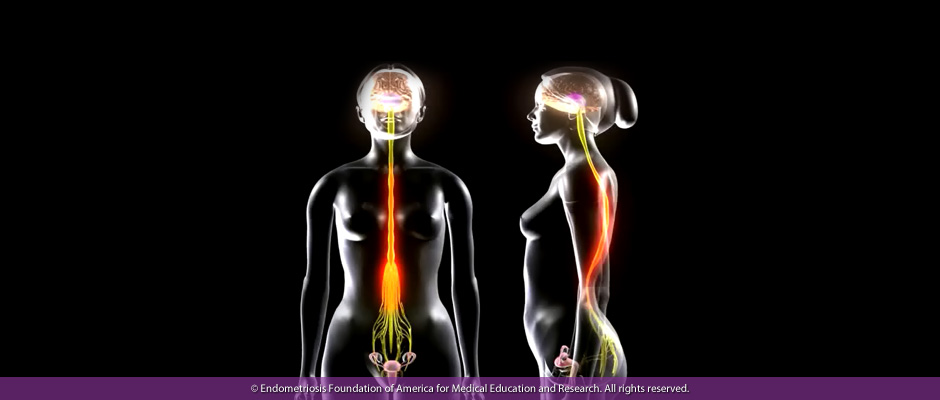
What is neuropathy?
The fifth predominant symptom is neuropathy.The pain caused by endometriosis does not necessarily mean the nerves are damaged. When you have neuropathy, the nerves of the pelvis are physically involved, either directly or indirectly. Endometriosis occurring involving the small fiber nerves of peritoneum are always the case, while rare, direct involvement of big nerves still does occur.
How can endometriosis cause neuropathy?
When endometriosis related inflammation spreads to regions within the pelvic cavity, it increases the risk of causing nerve damage. Endometriosis scar tissue can pull nerves, or even attack nerves directly. Lesions building around these nerves will apply pressure on the nerves themselves, thus causing a constant, sharp pain. Patients often describe this pain as a throbbing or stabbing sensation that is aggravated by physical activity or even walking. The sharper the pain, the more likely it is that a lesion is pushing directly on a nerve.
Where is neuropathy typically felt in endometriosis patients?
Not only does the uterus contain key nerves that send nerve impulses to your central nervous system (brain and spine), but there are also many vital nerves surrounding the pelvic cavity. Since endometriosis is a disease defined by its manifestation in anatomical regions outside the uterus, it is common in cases of neuropathy for lesions to spread to these vital nerves. The number of different ways in which this pain can manifest itself includes:
- Pelvic pain: The pelvis houses a meshwork of fine autonomic nerves that are not under our voluntary control, situated on the deep aspects of each sidewall. These nerves can be affected by endometriosis, which often causes gastrointestinal and bladder symptoms on top of the normal nerve pain and damage.
- Back pain and leg pain (sciatica): Nerve damage from endometriosis can also present outside of the pelvic cavity in the form of lower back pain radiating down one or both of the legs. This is due to lesions infiltrating the sciatic nerve and in turn causing sciatica. Patients with this issue may find themselves having trouble walking, and in more severe cases find themselves limping towards one side in order to tolerate the pain. Patients can also report muscle weakness and rarely paralysis of muscle groups.
- Hip pain radiating to the buttock: Like your back, the hip houses a network of thick nerves that play a part in the central nervous system, mainly the sacral bone (the bottom of your spine). Thus trouble walking or limping is a common symptom in these cases as well.
Misdiagnosis of neuropathy
Neuropathy is a significant symptom of endometriosis, but it is often mistaken by doctors as a symptom of something completely unrelated to the disease. More commonly in the case of neuropathy, doctors will diagnose a patient with the right symptom, but not reach the proper conclusion. For example, endometriosis patients with nerve pain are often told they have tendinitis or should seek a musculoskeletal specialist for further consultation when really they need to find the underlying cause of their pain through a gynecologist who is well experienced in endometriosis. This is not a matter of good versus bad doctor, but rather, endometriosis may have never been considered by the particular physician as it is not their field of practice. This is why it is important for a patient to be advocates for their own health and seek proper care from the right doctor.
Back pain, leg pain, headaches, and other neurological issues are strictly due to tendinitis and other neurological diseases.
Endometriosis patients can often be misinformed to go see a musculoskeletal or neurological specialist when their neurological symptoms are really due to endometriosis.
The difficulty with diagnosis & the importance of treating
Endometriosis is highly difficult to identify on its own, and endometriosis infiltrating the nervous system can be even more challenging to spot. Even upon magnetic resonance imaging (MRI), only large nodules invading nerves can be detected. Laparoscopic excision surgery with an accompanying pathology report is the only way to formally diagnose and treat such endometriosis. Because surgery should be used as a last resort, it is important to assess all the forms of treatment options for neuropathy due to nerve pain. Below are treatment options through which patients have found relief:
- Holistic approaches: Patients have resorted to physical therapy and exercise in order to overcome their nerve pain due to endometriosis. Acupuncture is also a highly popular option for patients suffering from neuropathy. While all these options can be considered, it is important to note that they aim to treat the symptoms rather than the underlying cause.
-
Medication: Many patients rely on over the counter medications and oral contraception for a number of their endometriosis symptoms, and neuropathy is one of them. Common over the counter medications are non-steroidal anti-inflammatory drugs (NSAIDs), such as ibuprofen and aspirin.
-
Excision surgery: Excision surgery is considered the gold standard for treating endometriosis, but endometriosis that has infiltrated the nerves requires a highly experienced gynecological surgeon, along with a neurological specialist on hand for consultation. The nervous system is highly sensitive and in turn, requires a thorough understanding of the deeper nervous system structures within the pelvic cavity. This is why it is crucial to find a surgeon with a vast amount of experience to handle such specific cases.
Warning against neuropathy with endometriosis
Like all symptoms, neuropathy alone is not a sign of endometriosis. But something such as leg pain combined with other symptoms that worsen with menstruation could mean that endometriosis is affecting the leg and nerves. Patients experiencing any or all of the classic symptoms of endometriosis with neuropathy should seek treatment before further complications arise. A cold is just a cold until it is ignored or misdiagnosed; then it can turn into bronchitis or a sinus infection or pneumonia. It’s no different with endometriosis, or any other disease for that matter. The more time that goes by before it is treated, the more it can spread throughout your body, and the more long-term health complications it can cause.
References
-
B. Gui et al., “Shining light in a dark landscape: MRI evaluation of unusual localization of endometriosis.” Diagnostic Interventional Radiology in US National Library of Medicine: National Institute of Health. July 23rd, 2017. https://www.endonews.com/special-considerations-for-the-evaluation-of-endometriosis-on-mri
-
MG medina and DI Lebovic., “Endometriosis-associated nerve fibers and pain.” Acta Obstetrics and Gynecology Scandinavica in US National Library of Medicine: National Institute of Health. 2009. https://www.ncbi.nlm.nih.gov/pubmed/19657753









